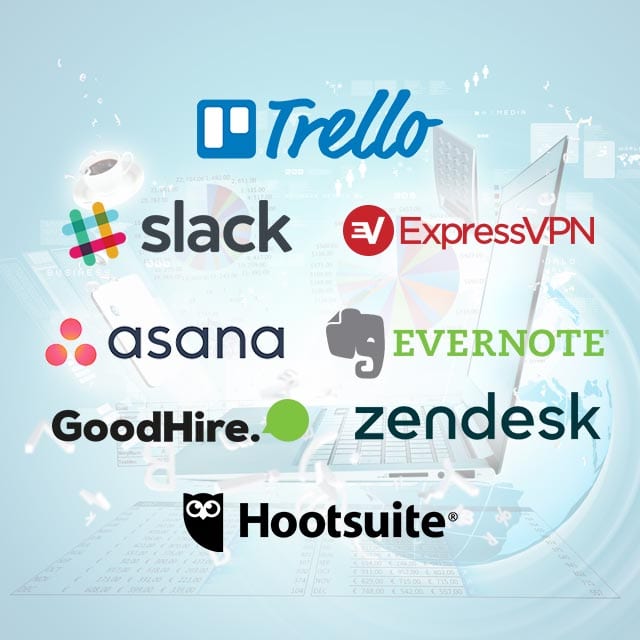It’s no surprise 2017 saw record surges in emerging startups. With so many new apps and devices readily available, entrepreneurs have never had more opportunities to turn their ideas into a reality.
That’s why it’s important to stay on top of the newest trends. After all, the only way to
#1. ExpressVPN
Because a growing number of employees are starting to work remotely (especially in the startup sector), it’s crucial that everyone’s network remains protected. One of the easiest ways to do this is to use a VPN, or virtual private network. Arguably the single most important tool on this list, a VPN keeps a person’s Internet-enabled devices safe by anonymizing their IP address and encrypting all their network traffic.
That means workers who use public WiFi will instantly be protected, thereby safeguarding any potentially sensitive documents shared between their browser networks. This is a great tool to have when working with remote employees, as most public networks (i.e. those found in coffee shops and restaurants) tend to have very poor privacy safeguards.
There are plenty of free VPNs readily available, but it’s worth paying extra for a reputable service like ExpressVPN since a single subscription covers multiple devices while offering stronger security.
#2. Slack
Need a helping hand getting everyone on the same page? Private messaging apps like Slack make it easier for everyone on your team to stay in the know. With tons of customizable options, including private messages, notifications, rich link summaries, and more, you won’t have to worry about inundating your employees with countless emails.
More than that, Slack is compatible with Google Drive and Dropbox, which allows you to sync your — and your employees’ — computers, phones, and even tablets. Plus, the interface is extremely approachable and easy to use.
#3. Trello
It’s all but impossible to get anything done these days without having a proper management system in place, and Trello does just that. As an all-in-one content management platform (CMS), Trello gives users the ability to manage their various tasks by setting up boards for specific projects. It also neatly organizes everything in one easy-to-find place, which means users can see, comment, sign off, and follow along with their various tasks.
Trello also lets users add to-do lists, upload and attach files, and lets anyone who’s invited to a specific project leave comments. While the free version is pretty robust, it’s worth upgrading for the added features.
#4. Asana
Have a hard time keeping up with all those deadlines? Maybe there’s a person on your team who needs a little reminding from time to time. Cue Asana. This handy app not only tracks individual user’s projects and milestones, it synchronizes them with the entire team.
Everyone using the app is able to see what everyone else is doing, and with tasks that require multiple steps, you can set up various project goals to keep everyone on the same page.
More than that, it also keeps track of various due dates and helps track employee progress. When combined with other project management apps, Asana is a seriously great tool to have.
#5. Evernote
For those more remedial tasks that require a lot of copying and pasting, Evernote is a must. With a handful of built-in functions, it helps users organize their personal projects to help them get more done faster, easier, and with a little extra pizzazz.
The great thing about Evernote is that it includes a bunch of other sub-apps within. Skitch, for example, is a great imaging tool that lets you take smarter screenshots and even gives you the ability to manipulate photos. It’s no Photoshop, but it’s a nifty tool to have when you’re working with a lot of images.
#6. GoodHire
One of the hardest challenges most entrepreneurs face is finding (and retaining) talented employees. Fortunately, GoodHire makes the process a little easier. By letting you vet prospective employees by quickly and thoroughly verifying their credentials, references, various skills, and more, GoodHire takes the ambiguity out of the hiring process, which is particularly helpful when looking for remote talent.
With turnaround times typically ranging from two to four days, GoodHire presents you with an up-to-date background check while combing over other verification stats. Even better, you can customize it to look for specific warning signs.
#7. Zendesk
Great for startups that work directly with customer support, Zendesk gives users the ability to keep track of various request and conversations by assigning them tickets. This makes it easier for everyone to keep track of employee concerns and to address each one easier.
One of the better helpdesk solutions currently available, Zendesk offers a simple interface that’s easy to pick up yet offers a ton of great intermediate features. Easy-to-use dashboards also help everyone manage tickets with real-time data and analytics.
#8. Hootsuite
Working with social media may be the new norm, but keeping up with multiple accounts can be hard. Fortunately, Hootsuite offers an easy way to keep up with all your various social channels by organizing them all in one place. Users can schedule posts, set reminders, and even check on-page analytics with the touch of a button.
This handy app makes the whole process around content creation easier by allowing everyone on your team to review, edit, and schedule posts. Best of all, it makes it possible for multiple users to switch between their various social accounts while keeping everything on the same page.
Looking to the Year Ahead
No matter the size, scope, or focus of your startup, taking advantage of these helpful tech tools can help build your business and grow your network. As experts are already predicting 2018 to focus more on internet technology and *gulp* more automation, streamlining your day-to-day tasks is crucial.
Don’t get left in the dark; start 2018 off with a bang by incorporating these new tools into your technical arsenal.


